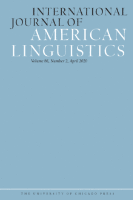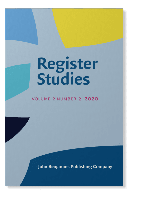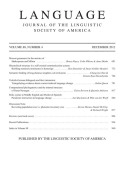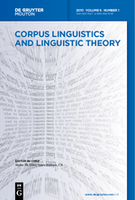
Linguas e Instrumentos Linguisticos
Scope & Guideline
Empowering Researchers with Scholarly Linguistic Analysis
Introduction
Aims and Scopes
- Language Policy and Its Implications:
Research on language policy explores how language functions as a tool of power and identity, particularly in territorial domains and institutional frameworks. - Discursive Practices in Society:
Examining how discourse shapes societal narratives, this area includes studies on media representation, political discourse, and the role of language in social movements. - Linguistic Education and Pedagogy:
Focusing on teaching methodologies and the training of language educators, this area addresses the intersection of linguistics and educational practices. - Enunciative Studies:
This unique focus on enunciative frameworks investigates how meaning is constructed through language use, including the roles of context and speaker intention. - Sociolinguistics and Language Variation:
Research in this area analyzes linguistic variation across different social groups, emphasizing the relationship between language, identity, and power structures. - Historical Linguistics and Language Ideology:
Exploring the historical development of languages and their ideologies, this area scrutinizes how linguistic concepts have evolved and their societal implications.
Trending and Emerging
- Language and Identity:
An increasing focus on how language constructs and conveys identity, particularly in discussions surrounding gender, ethnicity, and regionalism, highlights the importance of language in personal and collective identity formation. - The Role of Silence in Discourse:
Emerging research on silence as a communicative act reflects a growing interest in non-verbal elements of communication and their significance in various cultural contexts. - Critiques of Digital Discourse and Fake News:
The rise of digital media has led to increased scrutiny of discourse in online environments, particularly concerning misinformation and its societal impacts. - Intercultural Communication and Language Borders:
As globalization continues, studies on intercultural communication and the implications of language borders are becoming more significant, examining how language facilitates or hinders cross-cultural interactions. - Language Policy in Educational Contexts:
There is a notable trend towards examining language policies in educational settings, especially regarding inclusivity and the teaching of minority languages.
Declining or Waning
- Traditional Grammar Studies:
There has been a noticeable decrease in papers focusing on traditional grammar rules and structures, suggesting a shift towards more contextual and applied linguistic approaches. - Purely Theoretical Linguistics:
Research that is heavily theoretical, without practical applications or connections to societal issues, has become less prominent, indicating a trend towards applied linguistics. - Historical Linguistics without Contextual Analysis:
While historical linguistics remains relevant, studies that do not connect historical language developments to contemporary issues or ideologies are appearing less frequently.
Similar Journals

Revista Virtual de Estudos da Linguagem-ReVEL
Fostering Global Dialogue in LinguisticsRevista Virtual de Estudos da Linguagem-ReVEL is a prominent academic journal dedicated to the field of linguistics, published by REVISTA VIRTUAL ESTUDOS LINGUAGEM in Brazil. With its ISSN 1678-8931, ReVEL aims to provide a platform for scholarly communication and dissemination of research across diverse areas of language studies, including sociolinguistics, language acquisition, and discourse analysis. As an open-access journal, it fosters accessibility to important linguistic research, allowing researchers, educators, and students alike to engage with the latest findings without subscription barriers. The journal’s focus on innovative methodologies and interdisciplinary approaches makes it a valuable resource for those seeking to deepen their understanding of language dynamics in various contexts. By contributing to the growing body of knowledge in this field, ReVEL plays a crucial role in promoting scholarly dialogue and enhancing the visibility of Brazilian linguistic research on a global scale.

INTERNATIONAL JOURNAL OF AMERICAN LINGUISTICS
Fostering Dialogue on Language and Identity.The INTERNATIONAL JOURNAL OF AMERICAN LINGUISTICS, published by University of Chicago Press, is a revered scholarly publication dedicated to the exploration and advancement of linguistic studies, particularly those related to the American linguistic landscape. With an ISSN of 0020-7071 and an E-ISSN of 1545-7001, this journal serves as a vital platform for researchers, professionals, and students interested in the nuances of language, dialects, and linguistic structures through rigorous academic inquiry. The journal has established a commendable impact, reflected in its ranking within the Q2 category in Linguistics and Language and its placements in the Scopus rankings, thereby positioning itself within the 50th to 53rd percentile of its respective fields. While the journal does not provide Open Access options, it continues to be a cornerstone resource for those seeking to expand their understanding of American linguistics, already converging from 1996 to 2024. Through its continued commitment to excellence, this publication remains essential for those aiming to contribute significantly to the field.

Register Studies
Unveiling Linguistic Diversity Across ContextsRegister Studies is an innovative and vital journal dedicated to the exploration of linguistic registers and variability in language use across diverse contexts. Published by John Benjamins Publishing Co, this journal serves as an essential resource for researchers and professionals in the fields of linguistics, sociolinguistics, and communication studies. With its emphasis on empirical research and theoretical advancements, Register Studies aims to uncover the nuances of language in social interaction, providing a platform for high-quality scholarly work. Although specific accessibility options are not outlined, the journal adheres to rigorous academic standards and strives to contribute significantly to the understanding of language's role in society. By fostering an interdisciplinary dialogue, Register Studies equips students, researchers, and educators with the insights necessary to navigate and contribute to the ever-evolving landscape of language studies.

Language and Linguistics Compass
Navigating the Complexities of Language and CommunicationLanguage and Linguistics Compass, published by Wiley, stands as a premier journal in the field of linguistics, showcasing innovative and interdisciplinary research. With its ISSN 1749-818X and E-ISSN matching, the journal has built a robust reputation, achieving an impressive Q1 ranking within the linguistics category for 2023, placing it in the top 4% of its field. Its Scopus rank of 48 out of 1167 highlights its influence and significance among linguistics journals, boasting a commendable 95th percentile. This journal serves as a vital resource for researchers, professionals, and students, offering a wide range of accessible articles that illuminate current trends and advances within the domain of language studies. Although it is not Open Access, the journal is committed to quality and diversity in its publications, ensuring scholarly articles from various sub-disciplines of linguistics are represented from 2008 through 2024. Located in the United Kingdom, Language and Linguistics Compass invites contributions from around the globe, reinforcing its status as a leading forum for linguistic discourse.

LANGUAGE
Advancing the Frontiers of Linguistic KnowledgeLANGUAGE, published by the Linguistic Society of America, is a premier academic journal dedicated to the rigorous study of linguistic theory and practice. With an ISSN of 0097-8507 and E-ISSN 1535-0665, this esteemed journal has established itself as a leading publication in the field of linguistics since its inception. The journal has consistently maintained a high impact factor, being ranked in the Q1 category in Linguistics and Language for 2023, placing it among the top tier of academic journals. Notably, it also holds impressive Scopus rankings, being positioned at #75 out of 1088 in Arts and Humanities, and #89 out of 1167 in Social Sciences, demonstrating a significant impact and reach in the discipline. While it is not an open-access journal, LANGUAGE provides crucial insights into linguistic research, fostering a vibrant academic community. Spanning years from 1996 to 2024, it continues to be an essential resource for researchers, professionals, and students alike, aiming to advance the understanding of language in its myriad forms and functions.

REVUE DE LINGUISTIQUE ROMANE
Illuminating the Rich Tapestry of LanguageREVUE DE LINGUISTIQUE ROMANE, published by the esteemed SOCIÉTÉ LINGUISTIQUE ROMANE, is a prominent academic journal dedicated to the exploration of Romance linguistics. With its ISSN 0035-1458, the journal plays a significant role in advancing knowledge within the fields of linguistics and the history and philosophy of science. Although it does not currently offer Open Access, it provides critical insights and peer-reviewed research that are indispensable for scholars, educators, and students interested in the nuances of Romance languages. The journal, which has seen converged coverage from 2006 to 2017, and then again from 2019 to 2021, is ranked in the third quartile (Q3) across various categories within Scopus, reflecting its established presence in the academic community. As a vital resource for interdisciplinary studies, REVUE DE LINGUISTIQUE ROMANE is instrumental for those seeking to deepen their understanding of linguistic structures, cultural nuances, and the historical development of Romance languages.

Concentric-Studies in Linguistics
Exploring the depths of language and society.Concentric-Studies in Linguistics is a distinguished journal published by the National Taiwan Normal University, College of International Studies & Social Sciences. With an ISSN of 1810-7478 and an E-ISSN of 2589-5230, this journal contributes significantly to the field of linguistics, encompassing a wide range of topics from language acquisition to sociolinguistics. As of 2023, it holds a respectable Q3 ranking in both the Linguistics and Language categories, and it is positioned in the 28th and 24th percentiles within its Scopus ranks for the Arts and Humanities and Social Sciences, respectively. Although it operates under a traditional access model, its publication from 2014 to 2024 reflects a commitment to advancing academic discourse. Researchers, professionals, and students are encouraged to engage with its rich content as it provides a platform for innovative studies and critical analyses that push the boundaries of linguistic research.

NEUPHILOLOGISCHE MITTEILUNGEN
Advancing Philological Insights Since 1971NEUPHILOLOGISCHE MITTEILUNGEN, published by the esteemed Modern Language Society, stands as a significant contribution to the domain of Language and Linguistics. With a history dating back to 1971, this journal has consistently provided an academic platform for researchers and scholars, navigating through the intricacies of philology and linguistic studies. Although it is indexed in Scopus with rankings reflecting its position in the Arts and Humanities and Social Sciences categories, it currently does not offer Open Access, which may require interested parties to seek institutional access for its wealth of content. The journal has experienced periods of coverage discontinuation in recent years, yet it remains a valued source for advancing the understanding of language theories and linguistic practices. Its location in Helsinki, Finland, offers a unique European perspective on global linguistic issues. The journal is ideal for those looking to engage with evolving linguistic trends and contribute to contemporary discussions in the field.

Corpus Linguistics and Linguistic Theory
Advancing linguistic insights through empirical exploration.Corpus Linguistics and Linguistic Theory, published by DE GRUYTER MOUTON, is a premier academic journal dedicated to advancing the interdisciplinary field of linguistics through the lens of corpus-based research methodologies. With an ISSN of 1613-7027 and E-ISSN 1613-7035, this journal is a valuable resource for linguists, researchers, and students who aim to investigate language structures, usage, and their theoretical implications. Recognized as a Q1 journal in the realm of Linguistics and Language, it boasts impressive Scopus rankings, positioning it within the top 7% and 8% of its categories in the Arts and Humanities and Social Sciences, respectively. Its relevance is underscored by a commitment to publishing rigorous research from 2005 to 2024, addressing contemporary advancements in linguistic theory fueled by empirical data. While the journal is not open access, it remains an essential platform for disseminating high-quality scholarship that informs both theoretical perspectives and practical applications in linguistics. As such, Corpus Linguistics and Linguistic Theory plays a crucial role in shaping the future of linguistic studies, making it indispensable for anyone engaged in this dynamic field.

LINGUA E STILE
Cultivating High-Quality Research Across Multiple DisciplinesLINGUA E STILE, published by SOC ED IL MULINO, is a distinguished academic journal based in Italy that delves into the intricate realms of linguistics, literature, and philosophy. With an ISSN of 0024-385X, this journal has been a vital platform for scholarly discourse since its inception, covering a broad spectrum of topics from linguistic theory to literary analysis. Although it currently holds a Q4 category ranking in 2023 across multiple disciplines—specifically in Linguistics and Language, Literature and Literary Theory, and Philosophy—it remains committed to fostering insightful contributions that challenge and expand conventional understanding in these fields. While it does not offer open access, the journal diligently focuses on publishing high-quality research that appeals to academics, professionals, and students alike. With the convergence of multi-disciplinary approaches, LINGUA E STILE is positioned to engage with contemporary debates and developments, enriching the academic landscape from its base in Bologna, Italy, and inviting contributions that exemplify the evolving intersections of language and thought.